












by John Ferrannini
hen Governor Gavin Newsom
Wsigned the state budget June 29, he expanded California’s AIDS Drug Assistance Program and associated programs in a big win for the state’s End the Epidemics Coalition and people living with HIV/AIDS.
approved a resolution accepting $5.5
in state funds
go toward
by John Ferrannini
Now that the San Francisco Board of Supervisors has accepted a $5.5 million grant from the state for an LGBTQ history museum, it needs to find a site.
The supervisors voted for the resolution June 11. The deadline to spend the funds is March 1, 2026.
The state money was secured two years ago by gay state Senator Scott Wiener (D-San Francisco) to help develop an LGBTQ history museum in the Castro, as the Bay Area Reporter noted at the time. It supplemented $12 million allocated by San Francisco Mayor London Breed and gay District 8 Supervisor Rafael Mandelman.
Mandelman said no museum site has yet been acquired.
“It just means we’re accepting it to the city, not that we’re pushing it out into the world,” Mandelman said of the resolution. “We are not publicly designating a site right now, though I hope we are doing that soon.”
Mandelman said the state money will be used “for building out, not for acquisition” of a space.
At the June 30 Alice B. Toklas Democratic Club’s Pride breakfast before last month’s parade up Market Street, Breed made reference to the museum, saying, “We’re going to open a brand new LGBTQ history museum, Rafael Mandelman.”
As the B.A.R. previously reported, officials with the GLBT Historical Society said last year they’re ready to bid for a request for proposal for the museum. The mayor’s office said at that time a site would have to be identified before the city puts out an RFP.
Roberto Ordeñana, a gay man who’s executive director of the society, referred questions as to whether any progress has been made in finding a space to the mayor’s office, which did not return a request for comment by press time.
The archival group operates a small museum on 18th Street in the heart of the city’s LGBTQ Castro neighborhood. But it leases the storefront and would like to build a larger facility that it owns and is spacious enough to also house its extensive archives. It currently stores its collection in rented space along the Mid-Market corridor downtown where it also has its executive offices.
See page 8 >>
The coalition touted the expansion, stating in a news release that it’s “a highly significant win, especially in a year where the state had to fill a $44.9 billion budget deficit with difficult budget solutions, including a $500 million loan from the ADAP Rebate Fund, a state special fund that covers medications, health care premiums, copays and coinsurance, and related services for treatment and prevention for uninsured and underinsured Californians living with and vulnerable to HIV.”
End the Epidemics’ budget proposal maintained core ADAP services and increased investments in programs supporting people aging with HIV; transgender, gender-nonconforming and intersex people; and people who use drugs, according to the release.
Sebastian Perez, co-chair of End the Epidemics policy committee, stated the expansions “certainly reflect EtE’s syndemic approach to care, and we must focus on reducing racial disparities in HIV acquisition, in particular.”
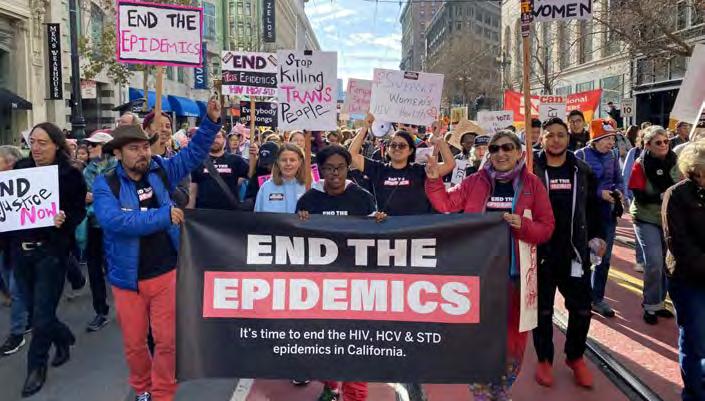
Specifically, on July 1, five appropriations from the rebate fund began. These are $10 million each year for three years for the harm reduction clearinghouse, which provides supplies to syringe services programs in the state, and $5 million each year for three years for HIV services offered by trans, gender-nonconforming, and intersex-led organizations.
Additionally, appropriations include $200,000 to assess and analyze the pre-exposure prophylaxis (PrEP Assistance Program) navigation and retention services; $200,000 to assess and analyze the delivery of ADAP health care navigation and retention services; and $5 million for access to internal and external condoms available to public school pupils in grades nine to 12.
See page 8 >>
by Matthew S. Bajko
Afederal survey is set to start tracking the number of LGBTQ people receiving research doctorates in the science, technology, engineering, and mathematics fields, collectively referred to as STEM. It comes as U.S. census officials await word on their request to add similar questions to a monthly survey the agency conducts.
The National Center for Science and Engineering Statistics is moving forward with the inclusion of sexual orientation and gender identity (SOGI) questions in its Survey of Earned Doctorates known as SED. The survey, which is conducted online each academic year, usually includes responses from at least 50,000 new research doctorate graduates.
The results, however, are delayed by several years, with the latest released being for 2022 and the 2023 one set for release this fall. The scientific statistics center, part of the U.S. National Science Foundation, plans to include the SOGI data about all individuals receiving a research doctorate from an accredited U.S. institution in a given academic year starting with the report for the 2025 graduating class.
The decision follows years of pressure from STEM professionals to see SOGI questions be
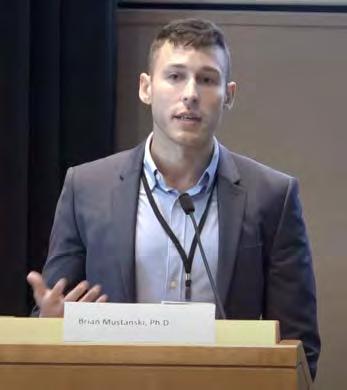
added to the various surveys conducted by the federal scientific agencies. A group of Democratic U.S. senators last year had penned a letter calling for better data about the number of LGBTQ people employed among the country’s scientific workforce, as the Bay Area Reporter previously reported.
One of the more vocal advocates pressing to see LGBTQ data be collected within the STEM fields has been Jon Freeman, Ph.D., a gay man who is an associate professor of psychology at Columbia University. He also is the director of the Social Cognitive & Neural Sciences Lab.
“These surveys are particularly important because the science fields account for one out of every four workers in the U.S.,” said Freeman.
Having the SOGI information is needed to better understand how evasive workplace harassment is of LGBTQ people employed in STEM fields and what barriers to career advancement they face, Freeman has argued. It can also be used, he noted, to press policymakers to address the issues.
“They were engaged in some weird mathematical gymnastics to not add SOGI, so I have been calling them out on it,” Freeman told the B.A.R. in a phone interview in early June.
The federal statistics center had tested adding SOGI questions to the STEM graduates survey. After initially announcing it would move forward with only asking about gender identity because too many people were quitting the pilot tested survey when they reached the sexual orientation question, Freeman obtained the data via a public records request.
See page 8 >>







compiled by Cynthia Laird
T
he Freedom to Marry initiative on California’s November 5 ballot has a number. It will be Proposition 3, the secretary of state’s office announced last week.
Assembly Constitutional Amendment No. 5, as it’s formally known, was authored last year by gay legislators Assemblymember Evan Low (D-Cupertino) and state Senator Scott Wiener (DSan Francisco). It seeks to remove the “zombie” Proposition 8 language that remains in the state constitution even though the 2008 anti-same-sex marriage law was overturned by the courts. That led to the resumption of same-sex marriage in the Golden State in 2013.
Last month, Governor Gavin Newsom was in San Francisco to launch the Northern California campaign to repeal the Prop 8 language. He told the Bay Area Reporter that he’ll do “whatever I can do” to help the Freedom to Marry initiative pass this fall.
If Prop 3 passes, the state’s governing document would be amended to state that “the right to marry is a fundamental right” and remove the anti-LGBTQ Prop 8 language that defines marriage as between a man and a woman.
Prop 3 is one of 10 statewide ballot measures that voters will decide.
The others are:
Prop 2, a $10 billion bond for K-12 schools and community colleges for repairs and upgrades.
Prop 4, a $3.8 billion climate bond for safe drinking water, drought, flood, and water resiliency.
Prop 5, which would lower the threshold to 55% for bonds supporting low-income housing, road and transit expansions, parks, wildfire resilience, and other infrastructure projects, as the Los Angeles Times noted.
Prop 6 is Assembly Constitutional Amendment No. 8. This would prohibit slavery in any form. (The state constitution already prohibits slavery in any form and involuntary servitude, except as punishment for a crime.) Prop 6 would prohibit the California Department of Corrections and Rehabilitation
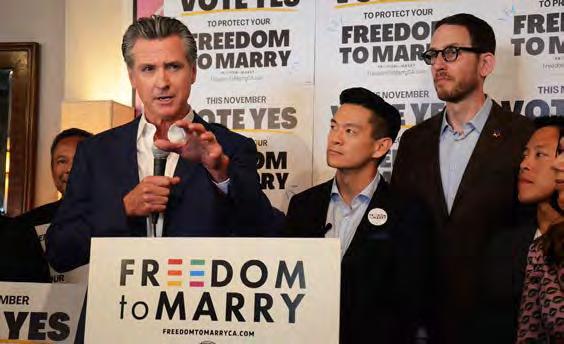
from disciplining any incarcerated person who refuses a work assignment.
Prop 32, which would extend minimum wage annual increases ($1 per year) until minimum wage – currently, $15 per hour for businesses with 26 or more employees, and $14 per hour for smaller businesses – reaches $18 per hour.
Prop 33, which would expand local governments’ authority to enact rent control on residential property.
Prop 34, which is aimed at Los Angeles-based AIDS Healthcare Foundation and would restrict spending by health care providers meeting specified criteria. AHF has for years spent millions of dollars on various statewide initiatives. The Times reported that the initiative applies only to health care providers that: spent over $100,000,000 in any 10-year period on anything other than direct patient care; and operated multifamily housing with over 500 high-severity health and safety violations. The Times noted it is sponsored by the real estate industry.
Prop 35 provides funding for MediCal health services by making permanent a tax on managed health care insurance plans that was to expire in 2026. The state uses this money to pay for health care for low-income families
with children, seniors, people with disabilities, and other groups covered by Medi-Cal.
Prop 36 would revise parts of Prop 47 that was passed by voters in 2014. It would change the law to make a third offense of theft, regardless of the value of the merchandise, a felony punishable by up to three years in prison, the Times reported. The measure also would make possession of fentanyl a felony. Finally, the measure would impose a “treatmentmandated felony” the third time someone is arrested for drug possession.
For more information on the ballot measures, go to the secretary of state’s office at https://tinyurl.com/mt9tfxpa
Tenderloin cleanup day
The Civic Joy Fund will hold a cleanup day in San Francisco’s Tenderloin neighborhood Saturday, July 13, from 10 a.m. to noon. Interested people should meet at the Phoenix Hotel, 601 Eddy Street. People will be picking up trash, painting graffiti, and power-washing streets in the district, according to an email announcement.
Afterward, participants can enjoy free food and DJs.
To sign up, go to https://tinyurl.com/ ruft48r2
MORE! Pride party raises over $100K for LYRIC
San Francisco drag artist Juanita MORE! has announced that she raised over $100,000 for LYRIC at her June 30 Pride party.
In an email to supporters, MORE! stated, “We raised over $127,000 from the party, with more donations still coming in.”
The funds will help LYRIC with its youth programs.
“The funds raised from the Juanita MORE! Pride event will go straight to youth stipends, helping to sustain their livelihoods and ensuring they have the resources they need to thrive,” Gael Lala-Chávez, LYRIC’s executive director, previously told the B.A.R. “The support from the Juanita MORE! Pride event will be nothing short of a lifeline for LYRIC, ensuring that we can continue providing critical services to our community.”
Lala-Chávez, who is nonbinary, wrote in a July 8 email that the funds raised now reaches $134,000.
“In an act of remarkable leadership and generosity, Juanita MORE! has significantly impacted LYRIC: Center for LGBTQQ+ Youth,” they wrote. “A simple text on February 12 marked the beginning of a transformative journey for the or ganization during an excep tionally challenging year.
“Juanita MORE!’s bold leadership and unwavering support have been a source of inspiration, especially at a time when queer and trans youth face relentless attacks both nationally and locally,” LalaChávez added. “These youth, often forgotten by the broader community, have found a steadfast ally in Juanita.”
future by helping our queer youth in their quest to carry on the legacy of our queer elders. I’m proud to say that this annual event has become one of the biggest nonprofit parties over Pride weekend.”
People interested in donating to LYRIC can do so at https://tinyurl. com/ycy93mph
Benefit for SF Public Press
A benefit for San Francisco Public Press’ 15th anniversary will also enlighten attendees about the underreported rise in secret deal-making between local governments and corporations. According to an email announcement, the event takes place Thursday, July 11, at the Kanbar Performing Arts Center, 44 Page Street in San Francisco. A fundraising reception will be held at 5 p.m., followed by the program at 6.
The discussion will feature veteran investigative reporter and editor Miranda Spivack in conversation with Lila LaHood, executive director of the San Francisco Public Press.

For 20 years, Spivack was a reporter and editor at the Washington Post, where she broke stories about how local governments failed in their responsibility to be transparent, the email stated. Her series “State Secrets,” for Reveal from the Center for Investigative Reporting, was honored with the Sunshine Award from the Society for Professional Journalists.
Spivack will also discuss her forthcoming book, “Backroom Deals in Our Backyards: How Government Secrecy Harms our Communities – and the Local Heroes Fighting Back,” scheduled to be published in 2025 by New Press.
LYRIC, located in San Francisco’s LGBTQ Castro neighborhood, has been fearful of city budget cuts, as the B.A.R. has reported. MORE! stated that she was glad to be able to help.
“I am proud that we can support LYRIC’s mission,” wrote MORE! “I want to keep building our community’s
Tickets are $250 for the fundraising reception, and sliding scale $10-$35 for the discussion. No one will be turned away for lack of funds for the main event.
To purchase tickets or for more information, go to https://tinyurl. com/52j6a7mv. t
by Gwendolyn Ann Smith
I wish I could say this will be the last time I need to write about the threats transgender people are facing in 2024. I’ve had to write about it a lot this year, and it gets hard not to write a column that repeats a string of vulgarities over and over again to describe my disgust with what is going on.
I would much rather be writing about some cool things going on, like the trans and nonbinary swim meet
being organized by some friends in Washington state taking place next month. It sold out in less than 24 hours. I’m pretty chuffed for them.
Yet, I also feel it’s important that my readers do know what’s going on in the world and how precarious things are right now. I want people to be safe, and I want people to know just what transgender and nonbinary people have to face right now.
For example, the U.S. Supreme Court’s decisions in both Loper Bright Enterprises v. Raimondo
24BelowMarketRate(BMR)RentalApartments IsleHouseonTreasureIsland
RENT
and Relentless Inc. v. Department of Commerce, overruled its 1984 ruling in Chevron v. Natural Resources Defense Council, upending 40 years of policy about how U.S. regulatory agencies work in this country. It has the potential to destroy the power of the Federal Drug Administration, the Environmental Protection Agency, and other agencies.
Not before it is used to harm transgender people, however.
It took nearly no time at all for a federal judge in Mississippi to cite the decision in ruling that the Biden administration cannot enforce new antidiscrimination rules to protect trans health care. Adding to it, a federal judge in Kansas blocked Title IX protections for LGBTQ students in Kansas, Alaska, Utah, and Wyoming based on the same high court decision.
Householdsmustearnwithintheincomerangelevelsbelowdependingonhouseholdsize: UNITS INCOMERANGE RENT
Studios 3Available $3,900permonth$1,950permonth
Studios
3Available $3,900permonth $1,950permonth
1Bedrooms 9Available $4,404permonth$2,202permonth
2Bedrooms 12Available $4,904permonth$2,452permonth
1Bedrooms 9Available $4,404permonth $2,202permonth
2Bedrooms 12Available $4,904permonth $2,452permonth
Mustbeincomeeligibleandmustnotownahome.
ApplicationsareavailablefromJune25toJuly16,2024,andmustbereceivedby5PMonFriday,July 16,2024. ApplyonlinethroughDAHLIA,theSFHousingPortalathousing.sfgov.org.contactIsleHouseleasingat (628)292-6304orBMR@IsleHouseSF.com VirtualLotterywillbeheldonJuly30,2024,at11AM. UnitsavailablethroughtheSanFranciscoMayor’sOfficeofHousingandCommunityDevelopment andaresubjecttomonitor ingandotherrestrictions.Visitsf.gov/mohcdforprograminformation.
Mustbeincomeeligibleandmustnotownahome.

No doubt, this is the tip of the iceberg, and I expect we will see challenges to LGBTQ protections across the board in the next few months, all thanks to a rogue Supreme Court.
ApplicationsareavailablefromJune25toJuly16,2024,andmustbereceivedby5PMonFriday,July 16,2024. ApplyonlinethroughDAHLIA,theSFHousingPortalathousing.sfgov.org.contactIsleHouseleasingat (628)292-6304orBMR@IsleHouseSF.com VirtualLotterywillbeheldonJuly30,2024,at11AM.
This will also play well into the hands of a potential second Trump administration, as former President Donald Trump could win in No vember. A lot of those who would come in with a sec ond Trump administration are backing Project 2025, dubbed a presidential transition project.
UnitsavailablethroughtheSanFranciscoMayor’sOfficeofHousingandCommunityDevelopment andaresubjecttomonitor ingandotherrestrictions.Visitsf.gov/mohcdforprograminformation.



This is a document created by the right-wing Heritage Foundation and numerous other
conservative organizations to bring a large number of hard right “reforms” to our all-too-fragile democracy. Among other things, it could spell the end of our national parks by selling off public lands, end the use of contraception, and eliminate no-fault divorce. Project 2025 also seeks to criminalize pornography. It is important to note, however, that its definition of pornography might differ a bit from yours or mine. For Project 2025, “transgender ideology” is pornographic, and in criminalizing such they are actually seeking to define my very existence as pornographic.
Of course, Project 2025 goes further than this. It is a draconian, authoritarian document.
It is so bad that Trump and his cronies are now busy trying to distance themselves from it, even as Trump and many former advisors in his first administration continue to advocate for the very things the project seeks. Some former administration officials, such as Stephen Miller, have promoted Project 2025, as the Washington Post noted.
Yet, this is but the tip of the iceberg, as we see trans support slipping across the country and world, and once-strong allies of ours backslide. These are, to say the least, very bleak times. A Pew Research Center report issued in June found a decrease in support for gender identity, as the Bay Area Reporter noted.
This said, however: not all is lost. All of this can still be fought against. This is July, not November.

Volume 54, Number 28
July 11-17, 2024 www.ebar.com
PUBLISHER
Michael M. Yamashita
Thomas E. Horn, Publisher Emeritus (2013)
Publisher (2003 – 2013)
Bob Ross, Founder (1971 – 2003)
NEWS EDITOR
Cynthia Laird
ARTS & NIGHTLIFE EDITOR
Jim Provenzano
ASSISTANT EDITORS
Matthew S. Bajko • John Ferrannini
CONTRIBUTING WRITERS
Christopher J. Beale • Robert Brokl
Brian Bromberger • Victoria A. Brownworth Philip Campbell • Heather Cassell
Michael Flanagan •Jim Gladstone
Liz Highleyman • Brandon Judell • Lisa Keen
Philip Mayard • Laura Moreno
David-Elijah Nahmod • J.L. Odom • Paul Parish
Tim Pfaff • Jim Piechota • Adam Sandel
Jason Serinus • Gregg Shapiro
Gwendolyn Smith • Charlie Wagner
Ed Walsh • Cornelius Washington • Sura Wood
ART DIRECTION
Max Leger
PRODUCTION/DESIGN
Ernesto Sopprani
PHOTOGRAPHERS
Jane Philomen Cleland
Rick Gerharter • Gooch
Jose A. Guzman-Colon • Rudy K. Lawidjaja
Georg Lester • Rich Stadtmiller Christopher Robledo • Fred Rowe
Shot in the City • Steven Underhill • Bill Wilson
ILLUSTRATORS & CARTOONISTS
Christine Smith
VICE PRESIDENT OF ADVERTISING
Scott Wazlowski – 415.829.8937
NATIONAL ADVERTISING REPRESENTATIVE
Rivendell Media – 212.242.6863
LEGAL COUNSEL
Paul H. Melbostad, Esq.


Bay area reporter
44 Gough Street, Suite 302
San Francisco, CA 94103
415.861.5019 • www.ebar.com
A division of BAR Media, Inc. © 2024
President: Michael M. Yamashita
Director: Scott Wazlowski
News Editor • news@ebar.com
Arts Editor • arts@ebar.com
Out & About listings • jim@ebar.com
Advertising • scott@ebar.com
Letters • letters@ebar.com
Published weekly. Bay Area Reporter reserves the right to edit or reject any advertisement which the publisher believes is in poor taste or which advertises illegal items which might result in legal action against Bay Area Reporter. Ads will not be rejected solely on the basis of politics, philosophy, religion, race, age, or sexual orientation.
Advertising rates available upon request.
Our list of subscribers and advertisers is confidential and is not sold. The sexual orientation of advertisers, photographers, and writers published herein is neither inferred nor implied. We are not responsible for unsolicited manuscripts or artwork.
It’s been good to finally see mainstream news reports over the last week about Project 2025. That’s the 900-page document prepared by the anti-LGBTQ Heritage Foundation and numerous other conservative groups laying out what a second Trump administration should include – and what it shouldn’t.
Kevin Roberts, Ph.D., the president of the Heritage Foundation, perhaps unwittingly set off the firestorm during an appearance on Steve Bannon’s podcast July 2. He said that the country is in the midst of a “second American Revolution” that will be bloodless “if the left allows it to be.”
From there, the floodgates opened as news reports were published about Project 2025. In fact, media accounts were so prevalent that former President Donald Trump, the presumptive Republican nominee, took to his Truth Social site July 5 to deny that he has knowledge about the document.
“I know nothing about Project 2025,” Trump wrote. “I have no idea who is behind it. I disagree with some of the things they’re saying and some of the things they’re saying are absolutely ridiculous and abysmal. Anything they do, I wish them luck, but I have nothing to do with them.”
Sure, right! Trump doesn’t know anything about it but then says he disagrees with some of the things in it. That’s a page right out of his playbook of lies.
Of course he knows about it. Many former Trump administration officials have been involved, and, as the Washington Post noted, one can’t separate the document from Trump. It may not be from the Trump campaign, but his administration, should he win in November, will use it as a blueprint and quickly try to implement much of it once in power. More to the point, conservatives have been salivating over Project 2025’s contents for decades. Abolish the federal Department of Education? That comes up every four years, either in GOP presidential primaries or the general election. The proposal is ridiculous, but like many other issues considered settled by law, the federal agency is now at risk of being overturned by an emboldened right-wing cultural backlash.
To actually read Project 2025 is to be transported in time back to the 1950s, when men worked outside the home, women tended to the home, and the heterosexual family unit was the gold standard. Never mind those pesky gays. Today, stable and flourishing families should be promoted, Project 2025 states, but that doesn’t refer to same-sex families. “Unfortunately, family policies and programs under President Biden’s [Health and Human Services] are fraught with agenda items focusing on ‘LGBTQ+ equity,’ subsidizing single-motherhood, disincentivizing work, and penalizing marriage,” it states.
Project 2025 is in denial over societal changes that have occurred over the last several decades. The authors are scared of the progress the country has made in civil rights, women’s rights, and LGBTQ rights. And the bad news is that all rights will be threatened if Trump wins.
Under the chapter about the Health and Human Services Agency, there’s this: “Radical actors inside and outside government are promoting harmful identity politics that replaces biological sex with subjective notions of ‘gender identity’ and bases a person’s worth on his or her race, sex, or other identities. This destructive dogma, under the guise of ‘equity,’ threatens American’s [sic] fundamental liberties as well as the health and well-being of children and adults alike.”

Even more radical is this statement in the forward, which Transmissions columnist Gwen Smith discusses in her piece this week: “Pornography, manifested today in the omnipresent propagation of transgender ideology and sexualization of children, for instance, is not a political Gordian knot inextricably binding up disparate claims about free speech, property rights, sexual liberation, and child welfare. It has no claim to First Amendment protection. Its purveyors are child predators and misogynistic exploiters of women. Their product is as addictive as any illicit drug and as psychologically destructive as any crime. Pornography should be outlawed. The people who produce and distribute it should be imprisoned. Educators and public librarians who purvey it should be classed as registered sex offenders.
And telecommunications and technology firms that facilitate its spread should be shuttered.”
The hits keep coming, especially when applied to trans people. Project 2025 would reinstate a ban on transgender people serving in the military. Recall that Trump issued the ban back in 2017, only to see President Joe Biden rescind it when he took office in 2021.
The document also advocates restricting the U.S. Supreme Court’s landmark 2020 Bostock decision. That ruling, written by conservative Justice Neil Gorsuch, found that sex discrimination applies to sexual orientation and transgender status of employees in the workplace.
Project 2025 is deeply concerned about federal regulations, or more accurately, wants to do away with as many of them as possible. (That got a big assist late last month from the Supreme Court, which gutted the ability of federal agencies to adjudicate matters relating to regulatory authority.) That, too, has been a key goal of Republicans for years. “Rescind regulations prohibiting discrimination on the basis of sexual orientation, gender identity, transgender status, and sex characteristics,” the document states. “The President should direct agencies to rescind regulations interpreting sex discrimination provisions as prohibiting discrimination on the basis of sexual orientation, gender identity, transgender status, sex characteristics, etc.”
Project 2025’s anti-LGBTQ language dehumanizes trans people as a proxy for all LGBTQ people. “Look at America under the ruling and cultural elite today: Inflation is ravaging family budgets, drug overdose deaths continue to escalate, and children suffer the toxic normalization of transgenderism with drag queens and pornography invading their school libraries,” it states.
Any way you slice it, Project 2025 is bad for America. It does not capture the ideals of today’s society and purposefully seeks to demonize and diminish Americans that these conservative groups hold in contempt – like us. Do not think for a moment that Trump isn’t aware of the document; he is, and should he win, this country will be staring down his effort to undermine democracy. t
by Matt Foreman
I’vejust wrapped up my first six months as executive director at the AIDS Legal Referral Panel, which has been providing free legal service to people living with HIV/AIDS for over four decades. Having been a “gay for pay” (i.e., a professional LGBTQ advocate) for the preceding 34 years (with 15 of them in San Francisco), I thought I was relatively well informed about HIV/AIDS. Not at all.
I will never forget my first experience with an ALRP client. I hadn’t actually started working at ALRP but came in to meet with our outgoing leader, the legendary Bill Hirsh. Though the office was closed for a court holiday, there was a knock on the door and Hirsh answered it. A thin, frail man, probably in his mid-50s, explained that he had just been discharged from the hospital after a three-week stay and, when he got home, he found eviction papers taped to the door of his apartment. The sheriff was due to come in a few days to remove him and all of his belongings from his longtime home. Hirsh jumped into action. While he scanned the eviction paperwork and called one of our staff attorneys to prepare an emergency motion to stay the eviction, I had a few minutes to speak with the gentleman.
He’d been in the hospital because of a kidney infection – infections were a recurring problem because his extremely low T-cell count made him vulnerable to viruses and bacteria that a functioning immune system would fight off. He lived alone and had lost almost all of his friends to HIV disease. He then asked to use the restroom, pulling up his pant leg to show a catheter drainage bag that was full of urine – that’s how he’d been sent home.
Hirsh came back and said we’d be in court for him the next day and that he was confident we could stop the eviction (we did!). I told the client how badly I felt for him and his situation. He looked me in the eye and said, “I’ve had HIV for more than 30 years and I’ve been through a lot worse. Don’t worry, I’ll get through this too.”
That day, and since then, I’ve learned so many things, both challenging and uplifting. I will start with the challenges:
Over half of HIV-positive San Franciscans – over 8,000 individuals – have late-stage HIV disease –AIDS – which means their health is always precarious.
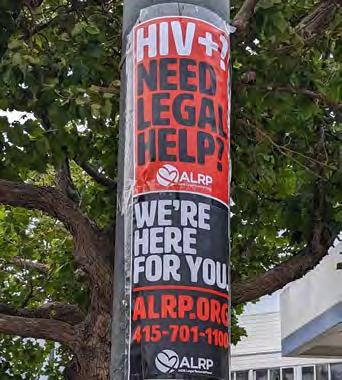
The AIDS Legal Referral Panel has put up flyers in San Francisco reminding residents of its services.
More than three-quarters of HIV-positive people here are over 50, and 25% are over 60.
The vast majority of older HIV-positive people are living alone, with tiny or nonexistent net works of friends or family.
Most older HIV-positive people cannot work and are forced to live on paltry government benefits. In fact, 80% of our 1,315 clients last year had an annual income of less than $30,000 to live in one of the most expensive cities in the country.
In spite of everything, almost all of our clients are extraordinarily resilient and determined to fight for their rights. Like the first client I met, far from being “victims,” they are true survivors.
Having a lawyer makes a world of difference. Our attorneys, for example, successfully resolve 85% of the eviction cases they handle. It’s similarly remarkable how often insurance companies, banks, and service providers back down once they know an attorney is involved.
While frayed and stretched, San Francisco has the nation’s most robust network of organizations focused on helping people with HIV, and it’s surprisingly non-competitive and mutually supportive.
In San Francisco, we have elected and appointed officials who actually care about people with HIV and remain committed to ending the epidemic.

Due to all of these circumstances, there is no such thing as a “small” legal issue for older, HIVpositive people. If not addressed quickly, one small thing can quickly lead to a cascading spiral of negative consequences.
The reason that San Francisco contracts out so many vital social services to nonprofits is because we are much less expensive than having city employees do the work. Deputy city attorneys, for example, start at more than $145,000 per year, nearly double the entry salary for legal aid lawyers. This same kind of pay disparity exists across almost all job titles. And people wonder why staff turnover among citycontracted nonprofits is such a challenge?
On the positive front, I’ve learned:
Over the last couple of months, we met with every member of the San Francisco Board of Supervisors and key people in the mayor’s budget office. Without exception, none needed any education on HIV and each seemed genuinely supportive. This played itself out during the most recent (and largely opaque) budget negotiations: the Board of Supervisors and the mayor’s department heads ensured that there would be no cuts in HIV services. This was accomplished through both the final budget bill and city departments’ commitments to find the money to backfill reductions in federal HIV funding. Special thanks go to Supervisors Rafael Mandelman, a gay man who represents the Castro, and Connie Chan, who chaired the budget committee, for their leadership. And finally, even with low salaries and less than optimal working conditions (putting it mildly), there are so many people – ALRP’s staff especially –who are dedicating their lives to advancing and protecting the rights, dignity, and health of people living with HIV/AIDS. I’m so proud to be on this journey with them. t
Matt Foreman, a gay man, is the executive director of the AIDS Legal Referral Panel (alrp.org). Previously, he held leadership positions in local, statewide, and national LGBTQ organizations and in a foundation that was a leading funder of the freedom to marry movement.
by Matthew S. Bajko
Amid a dreary fiscal year in California, LGBTQ archival groups and Bay Area service providers who work with transgender immigrants saw state legislators include funding to address their fiscal needs in the budget signed by Governor Gavin Newsom. Also included was a $10 million allocation to support LGBTQ community college students.
LGBTQ history museums and archives across the Golden State will share in $750,000 added into the fiscal year 2024-2025 budget Newsom signed June 29. Trans immigrant programs in San Francisco are set to receive $250,000 in funding.
The allocations were among the budget priorities pushed by the Legislative LGBTQ Caucus. Gay state Senator Scott Wiener (D-San Francisco) also championed them as chair of his chamber’s budget committee this session.
“In a horrible budget year with a huge budget deficit, we were able to deliver some key priorities for the community,” Wiener told the Bay Area Reporter in a July 8 phone interview. “I am grateful to our LGBTQ caucus. I would say the LGBTQ caucus members worked together to make sure we were able to deliver for the community.”
State lawmakers had to grapple with a $46.8 billion shortfall in balancing this year’s budget. Thus, the $297.9 billion spending plan included $16 billion in funding reductions among the package of savings hashed out by legislators and the governor.
Newsom thanked the legislative leaders for helping to deliver a “sound and balanced” budget proposal.
“This is a responsible budget that prepares for the future while investing in foundational programs that benefit millions of Californians every day,” stated Newsom. “Thanks to careful stewardship of the budget over the past few years, we’re able to meet this moment while protecting our progress on housing, homelessness, education, health care and other priorities that matter deeply to Californians.”
As outlined in Wiener’s Senate Bill 108, which Newsom signed into law last month as part of a package of budget bills, the Legislature intends to appropriate $10 million for LGBTQ community college students as a one-time allocation in the 2025–26 fiscal year.
The statewide chancellor’s office for community colleges is to award grants upward of $900,000 to the participating districts “based on the proportional share of students they serve and equity metrics to ensure that small rural colleges are also able to access the grants.” The funds can be used over a five-year period per the legislation.
Wiener told the B.A.R. it is not due to the enactment of any laws. For instance, a bill signed by former governor Jerry Brown in 2017 required California community colleges to include the needs of their LGBTQ students in their equity plans.
Rather, in 2021, the Los Angeles Community College District asked the LGBTQ caucus to support a pilot project it wanted to launch on its campuses. In 2023, the out lawmakers supported extending it for three years and expanded its scope, noted Wiener, thus the funding is needed for the extension of the pilot.
“Our caucus strongly supports

this pilot program to ensure LGBTQ community college students have the best possible experience,” Wiener told the B.A.R. “This funding helps community colleges create a sense of belonging and community for LGBTQ students.”
Trustee David Vela, the first gay Latino to serve on the Southern California community college district board, was instrumental in getting the pilot project started. In a statement to the B.A.R., he expressed his board’s gratitude for the ongoing state investment in the LGBTQ students’ futures.
“We are thrilled to see the inclusion of $10 million in the California state budget to support LGBTQ students at all the California community colleges. The remarkable success of our Los Angeles Community College District (LACCD) 2021 pilot project across our nine colleges demonstrated the positive impact of this targeted funding on our students,” stated Vela. “This allocation is a significant step forward in providing desperately needed resources, which includes safe zones and pride centers for all LGBTQ students in California.”
As the chancellor’s office had noted about the $10 million funding allocations in past budgets, the funds can be used for LGBTQ+ centers, development of safe zones, learning communities, clubs, curriculum development, workshops, and other efforts based on best practices for serving LGBTQ+ students. In an emailed reply to the B.A.R., Trustee Sue Chan, president-elect of the California Community College Trustees, noted the chancellor’s office will award the grants, though do to the limited amount, “only a handful” of the state’s 116 community colleges will receive them.
The LGBTQ caucus initially had sought $1.5 million for the various LGBTQ archival groups around the state. In the end, they were able to secure half of that amount, similar to the funding they secured in 2022, as the B.A.R. reported at the time.

The $750,000 allocation will again be distributed via the California State Library. It is to be used for the archival groups’ operational expenses. (See related story, page 1.)
“This is a continuation of the funding,” noted Wiener. “In the past, a few different times we were able to get statewide funding to support LGBTQ archives in San Francisco and other cities.”
According to a funding request document shared by the caucus and Wiener’s office, the $250,000 allocation for the Center for Immigrant Protection based in San Francisco was sought by the California Coalition of Transgender Immigrants. It is to be shared by three programs, with the bulk of the funds, $150,000, to be used for a trans immigrant asylee program.
A trans intersectional unity pro gram is to receive $50,000, while the remaining $50,000 is to go toward a trans emerging leadership and artist program. Pari varBayArea and the San Francisco-based groups the LGBT Asylum Project and El/La Para TransLati nas had advocated for the funding.

“That’s wonderful news,” said Anjali Rimi a trans woman who cofounded Parivar and is its president, when told by the B.A.R. Monday that the money had been included in the finalized budget. “I am absolutely excited and grateful.”



Nonetheless, Chan told the B.A.R. that the California Community Colleges “are appreciative” that Wiener saw that the funding was once again included in the budget.
“We acknowledge and thank Senator Wiener for his commitment to assist our Community College LGBTQ+ students with funding to create spaces where they feel safe, valued, seen, and supported,” noted Chan, who chairs the Board of Trustees for the Ohlone Community College District in the East Bay. “This funding will enable us to provide our LGBTQ+ students with services specifically designed to assist them succeed in their California Community College journey.”
Parivar and the LGBT Asylum Project announced last fall that they had partnered together to launch the Center for Immigrant Protection to address the needs of the LGBTQ immigrant community. Rimi said the state funding allocation will help the center and the communitybased organizations it works with to provide services statewide.
“We are grateful to Senator Wiener, the LGBTQ legislative caucus and everyone who was looking at this after many years of budget asks,” said Rimi, explaining that the trio of programs are part of the “core of our work and existence. This allows us to go statewide with that effort, at least that is the journey.”
DEADLINES: Friday 12 noon for space reservations Monday 12 noon for copy & images TO PLACE: Call 415 829 8937 or email us at advertising@ebar.com
Obituaries of 200-words or less are FREE to place. Please email obituary@ebar.com for more information.

by Matthew S. Bajko
Throughout Pride Month, Small Business Administrator Isabel Casillas Guzman visited LGBTQowned businesses to promote the various programs her federal agency has to support proprietors of small-sized companies. In early June, she stopped by Big Gay Smiles, a gay-owned Washington, D.C. dentistry providing care to the local LGBTQ community.
A few days later Guzman was in Chicago at lesbian-owned Christy Webber Landscapes. The nearly 40-year-old business has worked on the city’s historic Soldier Field sports stadium and other major projects.
“It is why I walk like I am carrying a wheelbarrow,” joked Webber in a brief clip of her visit with Guzman posted on the administrator’s Instagram page.
She praised the assistance she has received during her time in the landscaping field from the Small Business Administration. In particular, Webber noted what a lifeline it had been for her business to receive a Paycheck Protection Program loan from the agency during the onset of the COVID pandemic.
“I couldn’t have done what I have done here on the Westside without the SBA to back up the loans. It has been great,” said Webber.
Speaking by phone with the Bay
Area Reporter in early June, Guzman noted there was no better time for her to highlight LGBTQ small businesses than during Pride Month.
“The SBA wants to make sure they are getting the support they need. This is a great month to celebrate them and the impact they have,” Guzman said.
She explained that her focus is carrying out President Joe Biden’s belief that “every idea” can become a successful business given the right opportunities and development support.
“We at the SBA focus on the American dream and business ownership,” said Guzman, the 27th administrator of her agency who had been its deputy chief of staff in the Obama administration.
She was leading the California Office of the Small Business Advocate when Biden nominated her in early 2021 to the cabinet post in his administration.
Since then, Guzman has made it a priority to promote the SBA’s loans and other support programs to LGBTQ entrepreneurs. In particular, it has a Network for LGBTQ+ Businesses and a dedicated webpage for such enterprises where they can access SBA programs.
The network is also a way for the SBA “to bring focus on economic empowerment in the LGBTQ+ business community.” The National LGBTQ Chamber of Commerce has estimated that LGBTQ-owned businesses con-
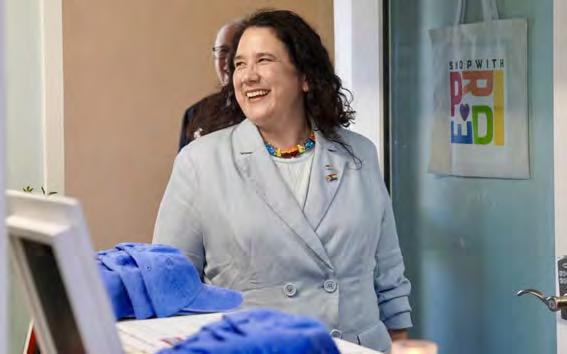
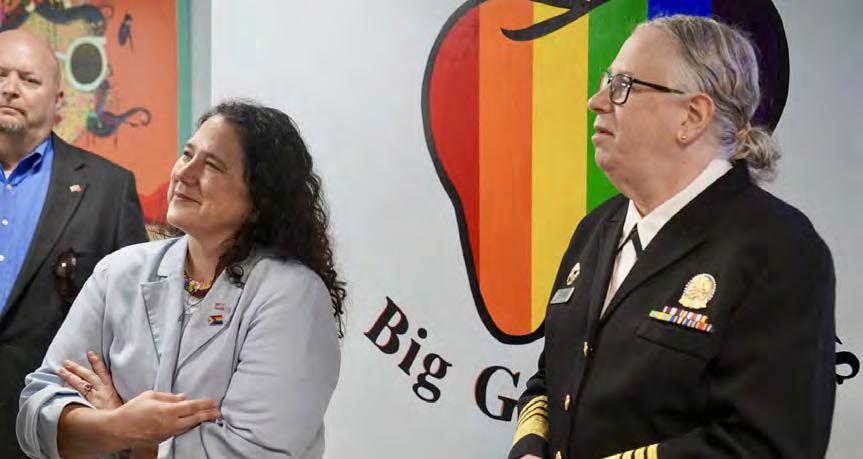
tribute nearly $2 trillion to the U.S. economy each year.
“It is, suffice it to say, an incredible impact,” Guzman told the B.A.R., adding that LGBTQ-owned businesses “are delivering products and services to our neighbors and solving local problems. They really help define our neighborhoods across America.”
Her Pride Month focus on such companies was aimed at plugging how they can benefit from the goals Biden has set for seeing federal dollars flow to small businesses. In April, the SBA announced that the Biden administration had exceeded its fiscal year 2023 small business contracting goal of 23% by awarding an all-time high 28.4% of federal contract dollars to small businesses. It totaled $178.6 billion in investments in the small business economy, noted the agency.
By lifting up the various programs and resources the SBA has for small businesses to take advantage of, Guzman said her aim for LGBTQ companies “is to help them be more successful.”
them to apply for federal contracts and other resources. The LGBTQ chamber has one specific for LGBTQ-owned businesses, while the federal government has ones for businesses owned by women, people of color, and veterans.
“There are various certification programs LGBTQ businesses can be a part of,” noted Guzman.
Even without certification, LGBTQ small businesses can take advantage of the SBA’s various loan programs, she added.
“We work with a network of lenders across the country to support small businesses,” said Guzman.
As the Business Briefing column noted in January, some owners of Bay Area companies focused on the leather and kink scene have experienced problems when seeking loans due to the nature of their businesses. While Guzman said she had not heard of issues faced by such businesses, she acknowledged that there are hurdles for minority-owned businesses.

She noted that LGBTQ businesses can apply for various certification programs that will then open the doors for
“Businesses owned by women, people of color, and LGBTQ businesses can face barriers in the capital markets,” she said. “Our focus is on increasing competition and adding more lenders and
mission-based lenders committed to supporting all communities.”
She noted that small businesses can be pre-screened via her agency’s website at sba.gov to make the loan application process easier. It also has a lender match tool that allows businesses to search for alternative lenders, she added.
“We have seen an increase in our small business lending, more specifically and especially access to small dollar loans,” said Guzman. “Those are often the lifeblood for startups or the lifeblood for our small businesses that line our main streets.”
Asked if she had a favorite LGBTQowned small business that she patronizes, Guzman told the B.A.R. that she has visited the gay bar Pitchers in D.C.’s Adams Morgan neighborhood “a couple times for happy hour.” Last year, during Pride Month, she accompanied second gentleman Doug Emhoff on a visit to it.
“It is always giving back to the community,” she said of the establishment.t
To learn more about the SBA’s various programs for LGBTQ small businesses, visit https://www. sba.gov/blog/2023/2023-06/pridemonth-tips-lgbtq-small-businesses
by John Ferrannini
AUC Berkeley employee charged in the killing of a gay Black man in Oakland last year pleaded not guilty to one count of homicide July 3. It followed a June preliminary hearing where an Alameda County judge ruled his case can proceed to trial.
As the Bay Area Reporter previously reported, Superior Court Judge Rhonda Burgess ruled June 18 that the evidence in the case was compelling enough after two days of hearing from witnesses for the prosecution in Department 11 of the Rene C. Davidson Alameda County Courthouse near Oakland’s Lake Merritt.
The defendant, Sweven Waterman, 39, of Oakland, had also pleaded not guilty last year after he was arrested and charged. The second arraignment was held following the decision in Waterman’s preliminary hearing. He is still being held in custody at Santa Rita Jail in Dublin. Waterman is on leave from his UC job.
At the July 3 hearing in Department 10, with Judge Kimberly Colwell presiding, Waterman also waived his right to a speedy trial within the next 60 days. He will be back in court August 23.
Waterman’s attorney, David Briggs, told the B.A.R. after the hearing that the

court date will be a “check in,” meaning the parties will see how ready they are to move forward and set more dates.
Prosecutors accuse Waterman of killing Curtis Marsh, 53, also of Oakland. Marsh, who was also known as drag artist Touri Monroe, was a hair stylist and a Miss Gay Oakland emeritus who used to sing with the Oakland Gay Men’s Chorus. Originally from Iowa, friends described him as fun, helpful, and active in his church.
Briggs has told the B.A.R. in past reports that Waterman did not know
Marsh, as far as he knew. Neither side is contesting that Marsh was killed at his apartment on Vernon Street in the Adams Point neighborhood just before 8 a.m. March 4, 2023.
Alameda County Deputy District Attorney Jake O’Malley conceded at the preliminary hearing June 17 that “we may never know what events transpired in that apartment.” Nevertheless, he alleges that “for the purposes of today ... the defendant was in that apartment when Curtis was killed, and his DNA is on the weapon.”
Three people testified at the hearing (spread over June 17 and 18), all called by the prosecution. The first to testify was Ariel Butler, one of the Oakland police officers who responded to Marsh’s home the morning of March 4. The second was homicide detective Kyle Cardana, who said when he arrived he saw Marsh’s body with stab wounds on the balcony of the apartment, as well as a “bent knife on the ground.”
“At first glance ... there may have been some blood on the knife,” he recalled.
Cardana said that as part of their investigation, police obtained a video showing a man arriving on a Lime scooter that morning after 5:17 a.m. The court viewed the video, and another taken after what is believed to be the time of the killing, showing a man leaving the apartment.
Police obtained a subpoena for financial records from Neutron Holdings Inc., which owns the scooters. It showed a scooter ride in Oakland that started at 5:10 a.m. March 4 and was updated after 5:17 as being paid for by Waterman, Cardana said. After being contacted by Oakland police, Waterman gave a swab of his saliva to the investigators.
The third to testify was Angela Freitas, a DNA evidence expert, who said Oakland police sent her office several samples, including four different swabs from the knife, as well as a swab of DNA from Waterman.
O’Malley asked what she’d discovered. There was DNA from four people on the knife, she said. One sample showed that it was 660 octillion times more likely DNA came from Waterman and three unknown individuals than if it was from four unknown individuals, she said.
“For reference, an octillion has 27 zeros,” she added.
Other samples had similarly high probabilities of coming from Waterman, Freitas testified.
Briggs honed in on the fact that DNA from at least two other people, who were not Waterman or Marsh, was found on the knife, including one that Freitas determined to be from a male who could not be identified using the Combined DNA Index System, or CODIS, an FBIrun database of the DNA of convicted offenders, unsolved crime scene evidence, and missing persons. Briggs also had Freitas concede it is possible water damage could compromise the reliability of the DNA evidence. (There had been a fire at the apartment the day of the killing responded to by the Oakland Fire Department.)
Briggs conceded last month that Burgess’ ruling the case could move forward was a foregone conclusion “given the low standard of preliminary hearings” –though he also noted that “there are a lot of unanswered questions in this case. t
Member of the Stanford Health Care LGBTQ+ community
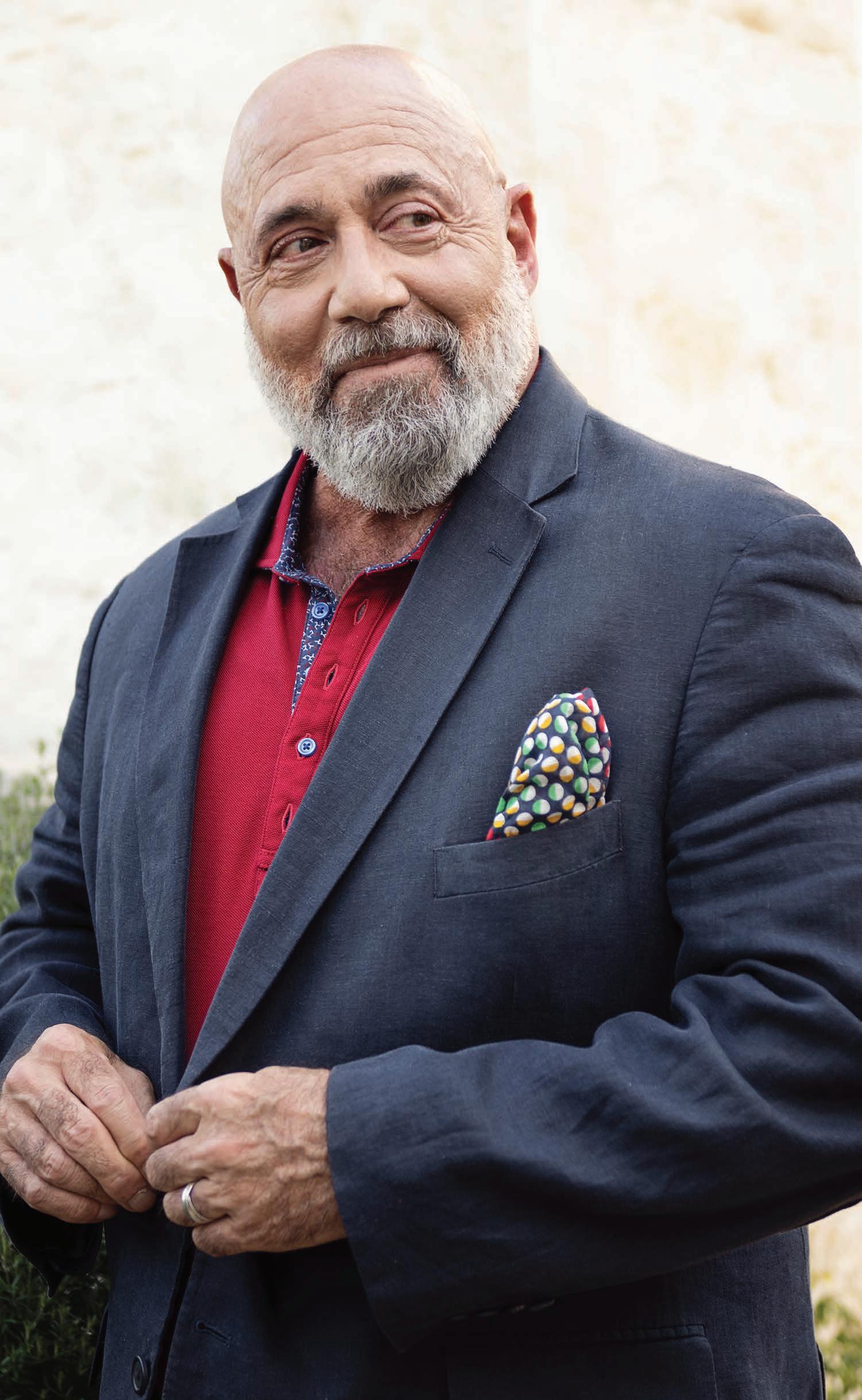

At Stanford Health Care, we are pioneering care specifically for the LGBTQ+ community. From preventive wellness to gender-affirming care, including innovative specialized surgical techniques, our LGBTQ+ Health Program sets the standard. We are even home to the first large-scale, long-term national health research study of LGBTQ+ people in the U.S.
Learn more about our LGBTQ+ Health Program at stanfordhealthcare.org/lgbtq


A site somewhere in the Castro is the preferred option to locate a new museum and archival facility. Yet, to date, city real estate officials have been unable to secure a property at a purchase price they would be willing to pay.
In a brief phone call July 9, Mandelman said he was “reasonably confident” a site would be found before the March 2026 deadline, and he’s hoping to “find something this year.”
Asked if he had any locations in mind now, Mandelman said, “There is a particular site.”
While he told the B.A.R. that “yes,” it was in the Castro, when asked if it was the former Pottery Barn site, he said,
From page 1
As he detailed in a report published online earlier this year, both SOGI questions “performed excellently” on the pilot studies when compared to standard quality metrics for federal surveys.
“NCSES’s next step should be easy: Include SOGI questions in all future surveys and stop hindering equity in STEM. The data are clear,” Freeman wrote in a commentary published in the April 12 issue of Science.
Speaking to the B.A.R. that month, Freeman expressed frustration with how long the federal statistical center had dragged out adding the SOGI questions to the SED.
“It seems like over the past six years, this agency has been stonewalling, delaying, and obstructing the process of adding these questions,” he said.
Feasible to add SOGI questions
A report released in May about the inclusion of the SOGI questions on the SED, which was conducted by RTI International for the federal scientific agencies, found it would be feasible to do so starting with the 2025 survey of the STEM graduates.
“Based on these results, considerations for the 2025 SED data collection cycle include adding separate questions for sexual orientation and for gender identity with detailed sets of response options and open-ended write-ins as well as assuring respondents that the
From page 2
Even with enemies at the Supreme Court, and threats lurking around the presidency, we can mount a defense and we can halt this.
No, it won’t be easy, and yes, it will take all of us.
Each of us needs to stand up against these decisions. The mainstream media has made it clear that it
From page 1
“Now I’m stopping.” The property at the corner of Castro and Market streets has been vacant for years and repeatedly has been mentioned as an ideal site for the new LGBTQ museum, but city officials have said the owners want too much money for it.
In a related matter, the recently signed state budget includes some funding to help cover the operational costs of LGBTQ archives across California. The $750,000 allocation included in the state’s fiscal year 2024-2025 budget is to be awarded via the California State Library.
“We have to wait and see how the state library administers them,” Ordeñana told the B.A.R. in a July 8 phone interview.
Nonetheless, the society expects to
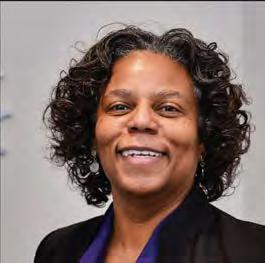
individual-level data will not be shared with their doctorate institutions to address concerns about confidentiality and privacy raised by SOGI minorities,” stated the 10-page report.
Of the 30,745 respondents to the SOGI test questions included in the report, between 2.5% and 2.9% identified as gender minorities depending on how they were asked the question. Between 13.0% and 14.7% answered affirmatively to the sexual minority questions used.
“This agency has been on and on for years about how small the population is and that these people don’t exist,” Freeman told the B.A.R. “Now we are talking about a study size of 30,000 Ph.D. grads in the country and we are talking 15% are LGBTQ-plus, which is much, much larger than a lot of racial and ethnic minority groups that are studied.”
Just as Freeman had concluded in
will not do it, so it is up to us to educate our friends, trans and otherwise, of the stakes. It is up to us to protest and make our voices heard. It is also up to us to find and secure allies with a common cause: feminist organizations, disability rights advocates, anti-racism organizations, abortion and sex worker advocates, and union and labor activists, to name just a few. We are stronger when we stand with others.
proved the pill Descovy for some groups and the drug Apretude as an injectable treatment.
receive some of those funds, as it has in the past. Ordeñana said that “the funding supports projects that educate people around the globe about the rich diverse history of LGBTQ individuals who have shaped California,” and pays for the work of students, educators and researchers.
Ordeñana said that a dozen LGBTQ archives are funded through the grant program, which advocates had initially hoped to have funded to the tune of $1.5 million over two years.
The LGBTQ+ Preservation and Accessibility grant program was originally cut from Governor Gavin Newsom’s May revise of the budget. The heads of eight archival groups and Equality California, the statewide LGBTQ rights organization, had sent a letter protesting
his own paper, the consultants reported that the “SOGI test questions in the SED yielded acceptable item nonresponse and survey breakoff rates while achieving construct validity.”
They added that “the SOGI test questions yielded comparable or better data quality than these questions as measured by item nonresponse.”
And as far as privacy concerns about the LGBTQ data go, the report noted in bold lettering that “the majority of SOGI minority and nonminority respondents indicated that reporting their SOGI information in a federal government survey was comfortable and easy for them to do.”
The consultants did suggest that respondents to the 2025 SED be informed “that their individual responses to the SOGI questions will not be shared with their institutions and will only be reported in aggregated form to help mitigate the risk of higher item nonresponse.”
The federal center then announced in early May that “pending approval from the Office of Management and Budget, these SOGI questions would be included in the 2025 SED data collection effort that begins in June 2024.”
Based on the results of the pilot, the White House budget office in late May signed off on the inclusion of the SOGI questions to the survey going forward.
“This collection is approved given the results of the 2024 Sexual Orientation and Gender Identity pilot. NCSES may proceed with collection,” it concluded. “OMB concurs with NCSES decision to share only aggregate SOGI
This is also not to say we should simply blindly follow those in power now, or diminish our needs for the sake of a coalition that would ditch us in our hour of need. We need to stay true to our principles and expect others to champion them, just as we might champion their needs. It would be pointless to stand tall, only to see those we support cut us off at the knees.
We also need to stand up for each
the cut to Newsom and lawmakers. (See related story, page 5.)
“With a rise in hateful attacks against some of the most vulnerable members of the LGBTQ+ community across the United States, along with the banning of books, education materials, and even references to the LGBTQ+ community, the preservation and dissemination of LGBTQ+ histories are more important than ever,” the June 4 letter states. “Our robust network of archives is at risk of being destabilized.”
Ordeñana thanked San Francisco legislators for the assist in providing the funding after all.
“We’re incredibly grateful to Senator Scott Wiener, who has continued to champion funding to support the LGBTQ archives throughout the state
information (conditional on an appropriate risk of harm and disclosure analysis) to academic institutions.”
The budget office also said it “strongly encourages” that the survey data from the piloting of the SOGI questions be released publicly “under controlled settings such as through their secure research enclave. OMB strongly encourages NCSES to seek public input on any planned revisions to SED recruitment, participation, collection, and data dissemination practices.”
In April, a spokesperson for the federal science foundation had told the B.A.R. that the STEM statistical center “is committed to and is conducting research to ensure the potential inclusion of SOGI questions in our surveys. NCSES’s SOGI research complies with the Office of Management and Budget statistical standards, is conducted in coordination with other federal statistical agencies, and uses a measured approach to ensure the findings appropriately balance data quality, respondent burden, privacy concerns, and data user needs.”
Since 2022 the Biden administration has been pushing federal agencies to improve their collection of LGBTQ demographic data in a host of realms. As the B.A.R. reported in May, the U.S. Census Bureau is eyeing an August start date for testing SOGI questions on its American Community Survey.
It is waiting for the White House’s budget office to approve its doing so this month. Known as the ACS for short, the federal questionnaire is sent monthly to 295,000 households in the
other. We are all hurting, and we need each other at this time. Look to your trans and nonbinary friends, and reach out to them. If we are, truly, a community, we need to act like it. Even when we speak a different dialect of transness, we need to find the harmonies that bind us together. The right is counting on our apathy. It wants us to be hopeless. It expects us to think our cause is lost. I’d be lying to say that isn’t seductive, af-
through the California State Library. His leadership was instrumental throughout the process,” Ordeñana said. “I also want to applaud Assemblyman [Matt] Haney for his budget leadership.”
Wiener, who chaired his chamber’s budget committee this session, told the B.A.R. he was happy to help.
“We worked extremely hard to ensure the state continues to invest in LGBTQ historical scholarship,” Wiener stated July 8. “Our LGBTQ historical archives up and down the state play a crucial role in strengthening and celebrating our community.”
Haney, a straight ally and Democrat who represents San Francisco’s eastside neighborhoods in the state Assembly, didn’t return a request for comment for this report. t
U.S. and Puerto Rico, and the SOGI question would be asked of all residents per household who are age 15 and older.
The ACS already asks if respondents are living in a same-sex couple household and whether that means they are married to or have an unmarried partner of the same sex. Based on 2022 ACS data, the census estimated there are roughly 1.3 million same-sex couple households in the U.S., with 57% of them married.
In a June 26 blog post timed to Pride Month, Census Bureau Director Robert Santos noted the agency’s proposed SOGI trial in the ACS. He said it will help census officials ferret out any issues in how it is asking the questions based on how respondents are answering them or if it appears they are confused by them.
“Other federal agencies have identified uses for SOGI information, such as for civil rights and equal employment enforcement. Collecting these data in the ACS would give us insights that have not been available from smaller surveys,” wrote Santos.
While he did not say anything about adding SOGI questions to the 2030 census form, Santos did list the various federal surveys his agency conducts where it collects LGBTQ data. He plugged a recently unveiled “landing page” at https://www.census.gov/topics/population/sexual-orientationgender-identity.html that makes it easy for the public and researchers to access the information. t
ter months – no, years – of having to fight back against their machinations and, in particular, at a time when it truly does feel like the wolves are not only at the door, but have found opposable thumbs. We need to hold onto whatever tattered shred of hope we have and drive them back. Our lives depend on it. t
Gwen Smith is mad as hell. You’ll find her at www.gwensmith.com
“PrEP and PEP uptake among young Black and Latinx gay, bisexual, and men who have sex with men is lower than uptake among white men, and transgender women of color are still disproportionately vulnerable to HIV,” stated Perez. PrEP, or pre-exposure prophylaxis, refers to the use of antiviral drugs to prevent people exposed to HIV from becoming infected. The pill Truvada was first approved for PrEP use in 2012 by the U.S. Food and Drug Administration; since then the FDA has also ap-
PEP, or post-exposure prophylaxis, involves taking medication after exposure to HIV.
End the Epidemics seeks to treat the HIV, sexually transmitted infection, viral hepatitis and overdose epidemics as one related syndemic and has advocated for $160 billion from the Legislature for programs and services since its start in 2018, the release noted.
to 600% of the federal poverty level; increasing the monthly cap on health care premium payment assistance from $1,938 to $2,996 for clients with commercial, employer-based, and Medicare plans; and the creation of an open formulary.
for HIV will continue to have access to life-saving medications and essential treatments, particularly those in our communities who may face the greatest barriers to care,” he continued.
Laura Thomas, senior director of HIV and harm reduction policy at the foundation, thanked lawmakers.
cess to convey to the legislature that the spread of HIV, STI, viral hepatitis, and overdose syndemic will only slow when the state adequately funds critical services focused on people facing the most barriers to quality prevention, care, and treatment.”
Tyler TerMeer, a gay man who is HIVpositive and CEO of the San Francisco AIDS Foundation, touted a “statutory commitment that loaned ADAP funds will be returned to the special fund when or if they are needed to maintain or expand services.”
“We worked hard in the budget to protect and bolster funding for people living with HIV and people at risk,” stated Wiener, who chaired his chamber’s budget committee this session. t << CA budget
Political Notebook
From page 5
Asked why it was important for the funds for the trans programs to be included in the budget, Wiener told the B.A.R. it is critical for California to provide resources to the immigrant and trans communities as both have come under attack this election year. Republican politicians, and even some Demo-
On January 1, three ADAP modernizations will begin. These are increasing the income eligibility from 500%
cratic public officials, have called for stronger controls to limit the number of immigrants entering the U.S. Meanwhile, conservative leaders in statehouses across the country have rolled back rights for trans residents of their states. The legislative attacks led California lawmakers in 2022, under a bill Wiener authored, to declare the state a sanctuary for trans individuals and their families seeking gender-affirming care out-
“This critical funding will ensure that individuals living with and at risk
lawed in their home states.
“If you think of who are the two groups that the right wing is attacking the most, it is immigrants and trans people,” said Wiener. “We are seeing a wave of hatred against trans people and immigrants in this country. It is imperative for California to stand by these communities.”
Not included in the final budget was an initial ask by the LGBTQ caucus of $5 million to fund the in -
“EtE is grateful to both the California State Legislature and the California Legislative LGBTQ+ Caucus for championing the EtE budget proposals in a very difficult fiscal environment,” Thomas stated in the release. “We are also incredibly proud of our coalition for uplifting our stories throughout the budget pro-
stallation of a new ADA-compliant main stairway and a new escalator to access the entrance to the Castro Muni Station from Harvey Milk Plaza in San Francisco’s LGBTQ neighborhood. The funding is included in a $25 million allocation toward the rebuild of the public parklet in a bond measure that Mayor London Breed and the city’s Board of Supervisors plan to put before city voters in November. t
Gay state Senator Scott Wiener (DSan Francisco) told the Bay Area Reporter that “it’s a great result for the community.”
Political Notes, the notebook’s online companion, returns Monday, July 15.
Keep abreast of the latest LGBTQ political news by following the Political Notebook on Threads @ https://www.threads.net/@matthewbajko. Got

by David-Elijah Nahmod
Sapphira Cristál is most definitely a star on the rise. She’s a trained opera singer, a songwriter, and a “RuPaul’s Drag Race” alumnus. She has a new EP out, and a hit single, “Enough,” which was shot on location in her beloved Philadelphia. In the song’s lively video, which showcases Cristál in a variety of colorful outfits, she sings, “I am enough for me, you can’t love me more than me, myself, and I.” She’s surrounded by an equally colorful chorus of singers and dancers.
Cristál is now on tour in a show called “The Cristál Ball Tour,” in which she shares stories of her diverse life. On July 17 she’ll make a stop in San Francisco to do a show at Bimbo’s, part of a multi-city tour that includes appearances all over the country, and even a few stops in Canada. Cristál is a busy woman. She’s all over the map. Even so, she found time in her busy schedule to sit down for an interview with the Bay Area Reporter.
David-Elijah Nahmod: Please tell me
















by Jim Gladstone
Painfully funny and crackled with intelligent ambiguity, “The Lifespan of a Fact,” now playing in a superb production at Berkeley’s Aurora Theatre, is but a single link in an unlikely lineage of artistic and philosophical responses to a suicide that took place 22 years ago this month.
Sixteen-year-old Levi Presley leapt to his death from atop Las Vegas’ Stratosphere casino. The arc of his fall intersected with the meaning-seeking imagination of John D’Agata, a wellregarded essayist and professor of creative writing who was living in Vegas at the time and volunteering at a local suicide hotline.
In the immediate wake of Presley’s death, D’Agata wrote a searching meditation that interwove an account of this tragedy with stoic observations on the nature of chance, the history Las Vegas and elusive notions of the American dream.
In 2003, D’Agata submitted his piece to Harper’s Magazine, which rejected it for a raft of factual inaccuracies. Defending his work as an artful reflection on the pithy topics it broached, D’Agata argued that, as an essayist rather than a journalist, his goal was to creatively summon a sense of Truth, not to objectively convey a series of facts.
In January 2010, a revised version of the Harper’s piece, titled “What Happens There,” was published in The Believer, a respected but considerably less prestigious magazine. The 20-page article had been meticulously fact-checked by Jim Fingal, an unpaid intern, whose queries and proposed corrections filled
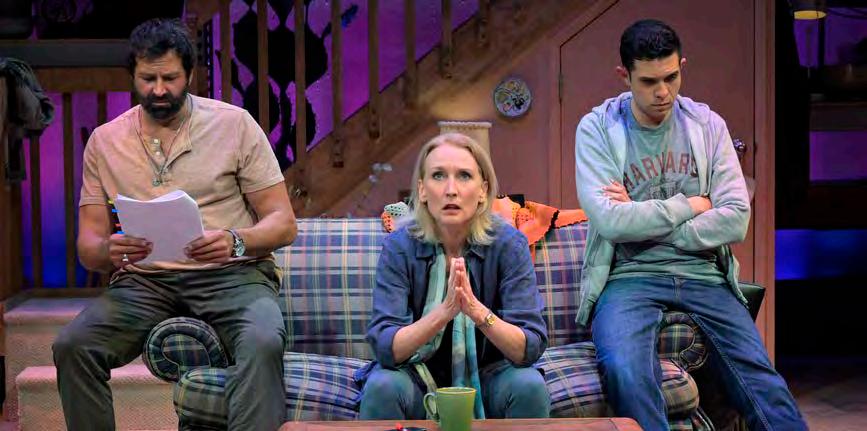
over 100 pages. Some suggested changes were made, but controversy flurried through the media.
In February 2010, D’Agata’s booklength essay, “About A Mountain” was published by W.W. Norton, then as a book,“The Lifespan of a Fact,” a book by D’Agata and Jim Fingal, was published by W.W. Norton. In it, the authors recreate and expand upon their aesthetic and moral arguments during the factchecking process for The Believer: fiction vs. nonfiction, facts vs. truth, and art vs. journalism were the conceptual fodder for a “based on a true story” battle between foes who, by the time of the book’s writing, had become friends.
In 2018, a hit Broadway stage version of “The Lifespan of a Fact,” adapt-
ed by playwrights Jeremy Kareken, David Murrell and Gordon Farrell, became a hit.
Odd couple
Directed with snap and speed by Jessica Holt, the Aurora Theatre production feels like a sit-com with a serrated edge. There’s lots of fodder for post-performance debate over fake news, “truthiness,” and integrity (of both artistic and journalistic stripes). But the show doesn’t mull and muse. Instead, it pushes its protagonists to entertaining comic extremes.
Elijah Alexander’s D’Agata is a shaggy Oscar Madison. Hernán Angulo’s Fingal is a persnickety Felix Unger. Both performances are terrific, tilting
‘Mrs. Doubtfire’ & ‘Drunk
by Jim Gladstone
This week, two wildly different Bay Area productions offer new spins on icons of 20th-century pop culture. Here’s a look at Drunk Drag Broadway’s salacious take on Disney cartoonery, and “Mrs. Doubtfire”’s musicalized nanny buffoonery.
Wait: “Mrs. Doubtfire” without Robin Williams?
Indeed. And, in fact, with genial Rob McClure in the dual lead roles of divorced dad Daniel Hillard and phony nanny Euphegenia Doubtfire, this musicalized stage version of the familyfriendly comedy, now at the Orpheum, is at least as enjoyable as the film.
McClure, who earned a Tonynomination playing this same part
on Broadway, is a whiz at physical slapstick, verbal timing, and Williamsesque vocal mimicry.
His unexpected riff as Donald Trump is one of several tweaks, along with the incorporating Siri and YouTube into the story to update the movie, set in the early 1990s, for the 21st century.
More importantly, McClure has a natural, lighthearted manner that’s pretty much the antithesis of Williams’ breathless impulsivity. He’s believable as a struggling father and adorably silly in disguise.
The cushion-hipped costume prosthetics, by Catherine Zuber, are a hoot; the rubbery face mask, which makes him look like Robin Williams as Mrs. Doubtfire, is a mistake.

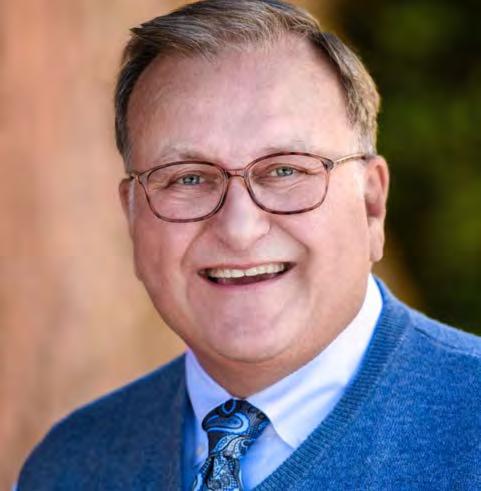



toward caricature but never toppling over the line. As their personae lean to extremes (Ably abetted by Jessie Amoroso’s costume design), so do Fingal and D’Agata’s arguments.
Fingal can be tough to take in his monomaniacal quest for accuracy, and D’Agata’s guiltless willingness to swap out reality for his verbal interpretive dance routines can feel like blatant disregard for his readers.
Carrie Paff plays the pair’s overseeing editor, Emily Penrose (a fictional character), with a delicate balance of tough love, restrained admiration, and deadline-driven urgency. It’s to both Paff’s and the playwrights’ credit that Emily is rendered more specifically than the male characters.
While they may initially view her as the lady rope in their macho tugof-war, Emily has her own stake in the game. She needs to burnish the magazine’s reputation by publishing groundbreaking stories, while protecting it from libel suits and the loss of advertising that tends to accompany them. For all the men’s self-aggrandizing arguments over truth and ethics, the buck literally stops at Emily.
This play, and the books and article, all exist in a queasy, shameless marketplace of “reality” and infotainment. Suicide elicits morbid curiosity. Controversy intrigues, and sells.
Even a prolonged debate between a writer and a fact-checker can be franchised as Intellectual Property.
This bizarre bloodline of cultural artifacts doesn’t end with the play. In 2023, director L. Frances Henderson made a documentary film adaptation of “About a Mountain” with a strong focus on Levi Presley’s death.
In tracing the Gordian-knotted genealogy of these works, one can’t help feeling that what began as a genuine quest for veracity has evolved into navel-gazing voraciousness. The rippling wake of Levi Presley’s suicide has carried artistic expression, philosophical pondering, and commercial byproducts. They’re discomfitingly one and the same.t
‘The Lifespan of a Fact,’ through July 21. $20-$65. 2081 Addison St., Berkeley. (510) 843-4822. www.auroratheatre.org
In the “Mrs. Doubtfire” film, as in many of his movies, Williams was believable only as stand-up comic Robin Williams, forcibly shoehorned into costumes and character summaries.
Williams’ perpetual strenuousness is here matched only by Nik Alexander, who is unrelentingly campy as Daniel’s hairdresser brother-in-law.
The show’s songs (pleasant, verging on anodyne) and book, by Wayne and Karey Kirpatrick along with John O’Farrell (who created the equally goofy but more original “Something Rotten”) hit all the familiar movie story points while making room for a few nonsensical, but entirely welcome, digressions. McClure’s loop-fueled hip-hop number kills. And a singing, butter-flinging Paula Deen is the superest sort of superfluous.
‘Mrs. Doubtfire,’ through July 28. $55-$251. Orpheum Theatre, 1192 Market St. (888) 746-1799. www.broadwaysf.com
Walternative lifestyles
It’s a small world after all.
So small, in fact, that an African lion cub, a Middle-Eastern street urchin, and a fishtailed chick who somehow hails from both Denmark and the Caribbean can get tangled up in each other’s business on the stage of a San Francisco queer bar.
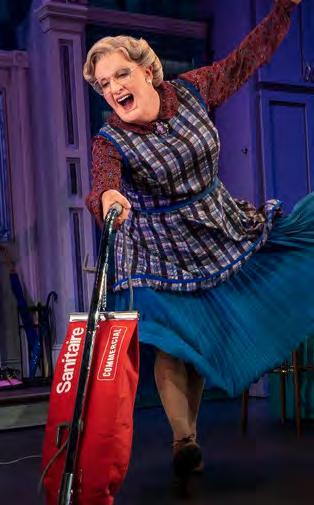
That’s the gist of the newly revised production of “Drunk Drag Dizney on Broadway,” which opens a ten-performance debut run on July 11 at Oasis.
The engagement marks the return of impresario Jimmy Pittman-Moore’s “Drunk Drag Broadway” musical parody series after a five-year, pandemicinitiated hiatus.
The show, featuring a cast of drag performers who sing live rather than lip sync, is a maximalist mash-up.
Not only does it hijack and hybrid-
ize the “The Lion King,” “Aladdin,” and “The Little Mermaid”, it douses the legends in liquor and lubricants, framing them in the style of Comedy Central’s “Drunk History” program.
Narrators Pittman-Moore, in drag as Chyna Maykit, and co-host Elsa Touche imbibe heavily, mixing and mangling the tales of our childhood heroes as an additional cast of nine (including Titus Androgynous, Kylie Minono, and Polly Amber Ross) enact their inebriated desecration of G-rated animation.
When Ariel warbles a deep-throated “Part of Your World,” the world she’s dreaming of is the Folsom Street Fair.
“When we first did ‘Drunk Drag Dizney,’” Pittman-Moore told the Bay Area Reporter, “The first half was more of a revue and the SimbaAladdin-and-Ariel story was the second part. This time we’ve written a full two-act plot.”
Imagine what such ambition could do with a Peter Pan/Pinocchio scenario.t
‘Drunk Drag Dizney on Broadway,’ through July 27. $30-$150. Oasis, 298 11th St. (415) 795-3180. www.sfoasis.com
For more arts and nightlife events, check out Going Out on www.ebar.com.

by David-Elijah Nahmod
Now through September 8, San Francisco Mime Troupe will perform “American Dreams,” a new musical that opens their 65th season. The show will be seen at various venues throughout the Bay Area.
“American Dreams” is a political show, a contemplation of what the future of the United States and the world might look like. It’s about the country’s ability to save democracy from despots, and from repression against those who speak up for justice and against the killing of innocents. The show follows a group of characters as they navigate the possibility that their American dream has been replaced with a nightmare.
But all is not lost. The show is also about hope, about how Americans have the power through their actions today, on Election Day, and even after Election Day to work for a better world.
Mime is the art of developing a character or telling a story through silent pantomime. No dialogue, just gestures and body movement. Yet “American Dreams” is filled with dialogue and songs, which begs the question, why call themselves a mime troupe?
“It’s a common question folks have,” said cast member Andre Amarotico in an interview with the Bay Area Reporter. Amarotico plays two roles in the show.
“The word mime comes from the Latin ‘mimus,’ in turn from the Greek ‘mimos,’ meaning mimic,” he said. “When we say mime we mean it in the classical sense. The ancient mimes often spoke aloud, and mocked the powerful with words as we do. Silent mime is an unspoken variety that has been popularized by great artists like Marcel Marceau, to the point that the word is almost synonymous with silence. That being said, we are not that kind of mime. We are certainly the outspoken variety. Always radical, never silent.”
Amarotico’s first character in the show is Harold, a MAGA fanatic who resents the rise of political correctness and woke culture. He has a tendency to indulge in dark, far right behaviors. His second character is Oliver, an environmentally minded tech worker. He is part of the economic machine pushing society towards A.I. and away from human intelligence. The show poses the question, can these characters be redeemed?
Theatrical challenges
Amarotico spoke of the challenges in playing two distinct characters in one show.
“On a technical level, we actors have to distinguish our individual characters with unique physical and vocal attributes,” he said. “Costumes help a great deal, but it’s on the actors in a Mime Troupe show to make it clear to the audience that they are observing two different people. We have a lot of tools for this, including how our characters walk, where they lead from in their bodies, the registers of our voices, even sometimes accents. The challenge, and the simultaneous joy in this, is that we have to flip the switch constantly and have those tools ready to be wielded with some agility. The effect is one of the most satisfying aspects of theater for audience and performer.”
SF Mime Troupe shows are known for being topical, which Amarotico feels makes them a unique company. He noted that the company does an original musical each year that speaks to the issues of the day.
“That’s one of the reasons I’m proud to call the Troupe an artistic home,” said Amarotico. “We talk about issues of consequence. We talk about the national and global states of injustice through art because we have to. And the fun thing is, we do it in a way that should always make you laugh and en-

tertain you. But we hope it also makes you think, and inspires action.”
As with all SF Mime Troupe shows, “American Dreams” will appeal to the company’s fellow leftists. According to
Amarotico, the show is a rallying cry for the like-minded.
“It’s also true that our shows rarely pull punches on the powerful, regardless of what political party they
belong to,” he said. “We do our best to give you, the audience, information and package it in a comedic and satirical way. All are welcome in that endeavor.”t
San Francisco
at various venues through September 8. Free-$20. Some venues require RSVP. www.sfmt.org
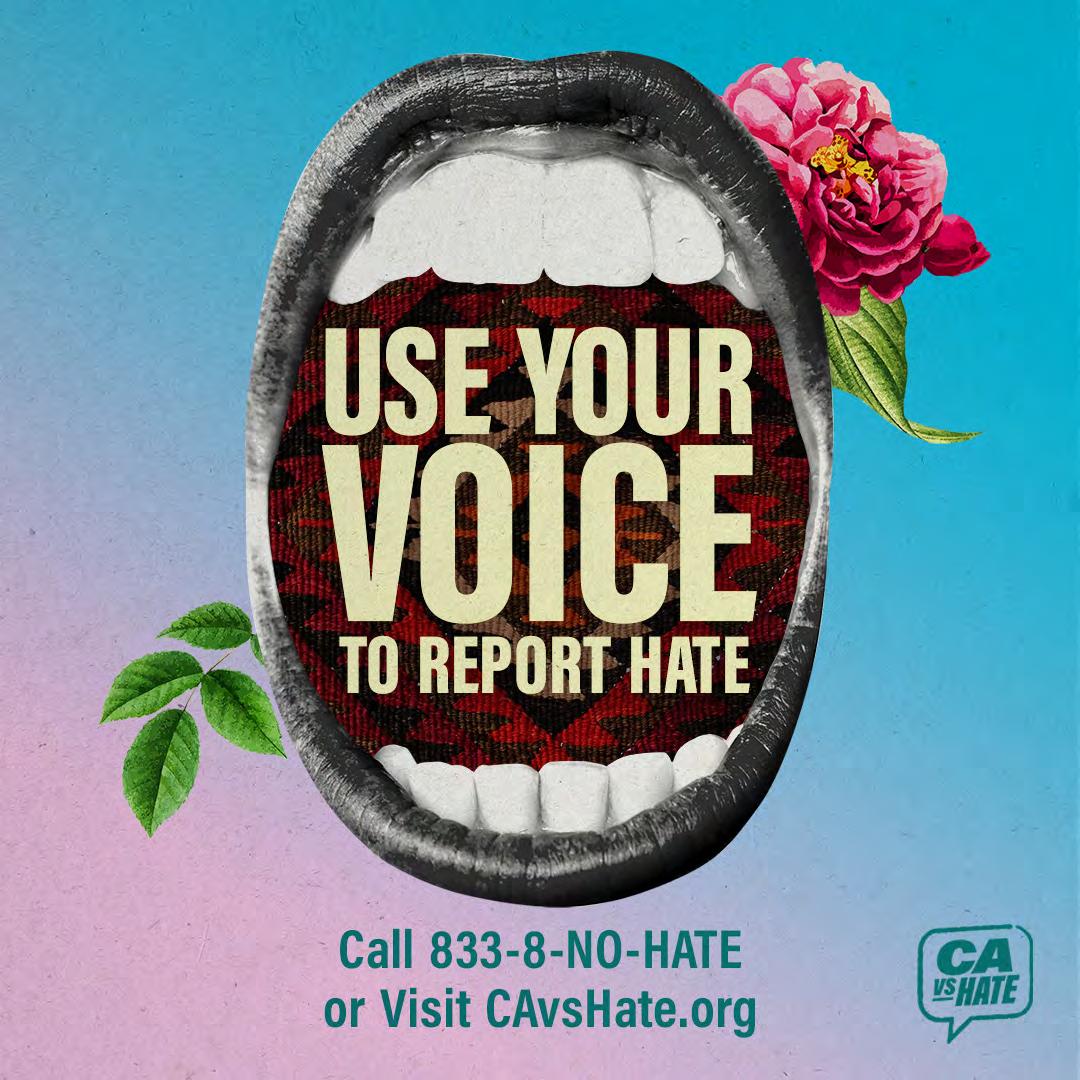
by Brian Bromberger
With states like Tennessee banning drag performances and anti-trans legislation spreading throughout the country at an all-time high, the new film “National Anthem” comes at an opportune moment, bringing much needed fresh air in a story about sexual outsiders finding sanctuary among themselves. Or as director Luke Gilford aptly summarizes his work, “We find ourselves when we are seen by others.”
Gilford, who grew up in the Professional Rodeo Cowboy’s Association with his father, in 2020 published his photography monograph comprising 100 portraits documenting America’s LGBTQ rodeo subculture. “I felt not just a sense of acceptance, but the electric charge of belonging,” he said.
He then co-wrote this movie to offshoot these feelings, radicalizing and making the very familiar Western genre inclusive, expanding what it means to be an American and queer, and perhaps inducing seizures in right-wing zealots.
Chosen family
Dylan (Charlie Plummer) is an introverted 21-year-old unskilled day laborer on construction and ranch jobs in rural New Mexico. His father long gone, he’s the main breadwinner and de facto father figure of the family. His alcoholic single hairdresser moth-
Queer patriotism flies its own flag

er Fiona (Robin Lively) pays more attention to the random men she brings home than her children, including his adoring much younger brother Cassidy (Joey DeLeon). Dylan’s dream is to buy an RV so he can escape his claustrophobic existence.
Lining up with other migrant workers, Dylan starts working at The House of Splendor, a dude ranch like no other. It’s run by Pepe (Rene Rosado) and flirty trans Sky (Eve Lindley), a skilled barrel racer. The chosen family residents there are other gay and trans people, all queer rodeo performers, with gay men gardening in pink thongs, skinny-dipping naked in a lake, or riding horseback in shimmering gowns. Carrie (Mason Alexander Park) is the

by Victoria A. Brownworth
It’s a too-hot summer literally, metaphorically and politically this year. As we write this, Death Valley is the hottest place on Earth, except perhaps in Washington, D.C., where we are watching the worst season of “Succession” ever.
Which is why tuning in to one of the most inspiring and heartbreaking documentaries in ages is worth the
Massage>>
BLACK MASCULINE & HANDSOME
Very discreet, hung, also friendly and clean - fully vaccinated. In/out. Cedric 510-776-5945. All types welcome. No blocked numbers please.
nonbinary drag queen who acts as the den mother. “Drag is a way for me to show up for myself,” she declares.
Dylan develops a crush on the freespirited Sky, even masturbating to a fantasy image of her decked out in an American flag outfit. She’s in an open, polyamorous relationship with Pepe. After imbibing mushroom tea, they fall into a sensual threesome, but Pepe feels threatened by the ever-closer connection between Dylan and Sky.
Dylan, who thinks he’s boring, wonders why Sky is interested in him, to which she replies. “I don’t think you’re boring. You just haven’t met your people yet.”
The wide-open space, geographically and emotionally, allows Dylan to
not only find community but explore his sexual identity and discover his true nature. He finds a real sense of belonging, because growing up he didn’t sense he fit in anywhere. He even feels safe to ride a bull for the first time and put on blue eyeliner makeup, a cheap wig, and make his sexy drag debut lipsynching Melissa Etheridge’s “I’m the Only One.” Both acts are brave, taking him out of his comfort zone.
He also brings Cassidy to this queer rural paradise and even he wants to wear a dress. When Cassidy meets Carrie, he naively asks, “Are you a girl or a boy?” Smiling, Carrie answers, “Neither,” to which Cassidy says, “Cool!” Even a spontaneous trip to Wal-Mart by the ‘family’ seems adventurous and bold.
Languid scenes
The screenplay is scant though non-pandering and non-strident. This is a film with its carefree pacing and languid scenes, that broadcasts its message through atmospherics, aided enormously by the visual lyricism of Katelin Arizmendi’s (“Dune”) cinematography. She invigorates sprawling barren desert landscapes with almost mesmerizing breathtaking sunny hues and yearning, intimate closeups of the character’s facial expressions, taking advantage of the Southwestern natural light.
One splendid sequence is a Black drag queen in sequined gown and
ten-gallon hat singing an a cappella rendition of “The Star-Spangled Banner,” beautifully rendered by D’Angelo Lacy. This film could easily have lapsed into a parody of hetero-cowboy machismo, but instead this is a safe space for those victimized by toxic masculinity. Yes, there’s been rejection and heartbreak, but there’s joy and resiliency, echoing President Biden’s mantra after his disastrous debate performance, “When you get down, you get back up!”
There’s a sense of wonder and gratitude that this is a welcoming, freethinking subculture embodied with nonjudgmental warmth, that they’ve finally arrived home, a queer space free from prejudices and strict boundaries. Gilford has great affection and compassion for all his characters.
What is so amazing about this film is that it comes across as both traditional and progressive, turning the Western and Americana topsy turvy. If only rural America could be as inclusive and life-affirming as The House of Splendor. The film seems to disrupt all the binaries that seem to separate us from one another and we appreciate everyone’s journey of finding their unique American dream in their search to live life to its fullest, a vision of what America could become.t
‘National Anthem’ opens in theaters July 12. www.variancefilms.com



mood change.
“My voice is the conductor of my life,” says the incomparable Celine Dion in the new Amazon Prime original film.
Directed by Academy Award nominee
Irene Taylor, “I Am Celine Dion” gives us a raw and honest behind-the-scenes look at the iconic superstar’s struggle with a life-altering illness. Serving as a love letter to her fans, this inspirational documentary highlights the music that has guided her life while also showcasing the resilience of the human spirit.
The new documentary detailing Dion’s disease includes a traumatic scene where the music legend is unable to speak or move due to severe muscle spasms.
“Orphan Black: Echoes” is the sequel series to the original that aired in 2013. Krysten Ritter stars as Lucy, a woman trying to find out where she came from and who she is. She discovers in episode 1 that she may be part of the clone experimentation process that former protagonist Sarah Manning and her “sisters” were. Lucy finds herself unable to remember the details of her life and it all pivots from there.

And yet her heart does indeed go on. Dion has long been a champion of the LGBTQ community and it’s painful to see her suffer so terribly. But this is an amazing story. While you will weep through it if you’re human, it’s empowering and uplifting and so worth your time.

Created by Anna Fishko, based on “Orphan Black” created by John Fawcett and Graeme Manson, the series is set in 2052 in the same universe as “Orphan Black.” The 10-episode series premiered on June 23, 2024, on AMC, AMC+ and BBC America.
“Orphan Black: Echoes” is phenomenal and one of the queerest things on TV right now, with gay and lesbian and nonbinary characters. Ritter is fabulous as bisexual Lucy. She’s angry, hurt, and heartbreakingly real as she flees the people who literally made her and tries to build a life for herself with Jack (the gorgeous hot Avan Jogia) her boyfriend and a former army medic and single father to daughter Charlie (Zariella Langford-Haughton) as who is Deaf.
Dr. Kira Manning (Keeley Hawes) is Lucy’s creator and has a deep bond with her that is revealed over time. A lesbian scientist deeply enmeshed in cloning experimentation, she’s the wife of neuroscientist Dr. Eleanor Miller (Rya Kihlstedt) and mother to Lucas (Jaeden Noel). She is the
daughter of Sarah Manning, the protagonist from the original “Orphan Black” series.
Eleanor was originally Dr. Kira’s professor while they were researching drugs for a cure for Alzheimer’s Disease. Part of their story is Kira using her questionable ethics to save Eleanor’s life.
Jordan Gavaris plays Felix Dawkins, Kira’s artist uncle. Gavaris reprises his role from the original “Orphan Black” series and could not be gayer. (Gavaris is gay in real life.) There are some fabulous scenes with him in a bar with Kira that we won’t spoil, but OMG, it’s the best.
“Orphan Black: Echoes” is absolutely riveting TV and Ritter is doing her best work since “Jessica Jones.” It’s immersive and queer AF.
Soaps
Daytime dramas have a mixed relationship with LGBTQ characters, as we have noted over the years here.
But the current storyline featuring Blaze (Jacqueline Grace Lopez) and Kristina (Kate Mansi) on “General Hospital” is superb and raises some intriguing questions about how perspective has shifted on queer people, media and branding in recent years.
Blaze –the stage name of Latinx singer Alison Ramirez– and Kristina Corinthos, founder, CEO and director of a local LGBTQ center in Port Charles, New York, where “GH” is set, have been lovers for a year now. Their relationship has been complicated by Blaze’s career and her being in the closet and Kristina choosing to be a surrogate for her sister Molly’s baby.
Kristina has had to navigate Blaze’s closetedness as well as dealing with Blaze’s mother, Natalia RogersRamirez (beloved soap veteran Eva Larue), who is virulently homophobic. But the two love each other wildly and have even fantasized about the baby being theirs.
But true love never runs smooth on soaps. Natalia vents about the relationship between her daughter and Kristina to Ava (Maura West), who has her own agenda. It’s a truly ugly homophobic rant and not something anyone would want made public, let alone a manager of musicians, which Natalia is.
When Ava discovers that she accidentally recorded Natalia, she decides to use that recording to take down Natalia in Sonny’s eyes by giving it to the local tabloid newspaper.
But when the recording goes viral, unintended consequences are manifold and Ava tries to walk it back. Blaze has also been the face of Deception cosmetics, but they decide they must cancel her because they can’t be perceived as supporting either a closeted spokesmodel or inadvertently, homophobia.
Then the board at the center that wouldn’t exist without Kristina ousts her because she is with a closet case; bad optics that undermine their message.
The pièce de résistance is Blaze’s label, which her mother convinced her would drop her if they knew she was gay, instead drops her for hiding that she is.
It’s a heartbreaking series of events, but Kristina tells Blaze she’s in it for the long haul and no one should force anyone out of
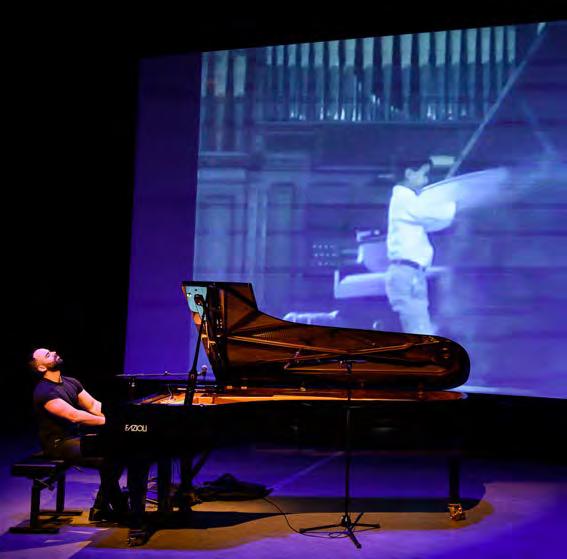
‘Inheritances’
From page 11
July 17 at Brava Theater. The collected works will be released later in 2024 by New Amsterdam Records.
The suite of works, about more than the monetary or familial aspect, has elicited unusual and sometimes emotional responses from his audiences. In a phone interview from Brooklyn, Tendler discussed the personal nature of autobiographical music works, as well as the technical process of commissioning works and performing them.
Jim Provenzano: Adam, you’ve said that while the works are personal relating to the death of your father, there’s also an aspect of your being gay.
Adam Tendler: The program in many ways touches on it. Many of the composers are gay or trans or just queer. A lot of the themes and elements are more about identity than certainly about grief or loss.
What were the challenges of interpreting the commissioned works?
Some of the scores can be graphi-
cally notated or by using alternative notation. It was always exciting to see what would happen. Sometimes I was in on the process. The one that looks like a diary entry is Darian Donovan Thomas’ piece (“We Don’t Need to Tend This Garden, They’re Wildflowers”). That’s actually the most explicit one about my dad, because Darian designed it to be almost like a stream of conscious therapy session. He asked for pictures, and some of the prompts are questions he wanted me to frankly explore on stage in front of people.
It’s not technically hard, but that one, for instance, when I recorded it, I saved it as the last thing to do after two days of recording. It’s hard to do much after that, because it’s emotional draining. Each piece has levels of difficulty in different places. But what’s exciting is that because they’re so diverse and they’re so different from each other, I find that each piece really hits people in different ways. And I really love to talk to people after the show, really get their feedback about which piece resonated with them. It’s always very different across the board.
My father died in very late 2019, just before the pandemic. It was right around autumn of 2019. I learned
Did you ever think that drag would be as big as it is now?
Yes. I think drag is and always has been the embodiment of freedom. It allows people to imagine a world where they are free to explore themselves and have fun, so of course it will be huge. Drag gives people hope, and anything that provides hope will persist and be adored and cherished.
Tell us about your operatic aspirations.
Opera is one of my greatest passions. When I was in college, I starred as Jack Point in “The Yeoman of the Guard” in Rochester NY and performed as Jack in “Die Fledermaus” at the Longy School of Music. Not too long after that, I ended up homeless in Boston which threw my operatic career off track. My dream is to play the role of Carmen in drag (wink wink). Who wants to cast me?
You’re also a songwriter. What subjects do you like to write about?
My primary subject is love, and more specifically self-love. A lot of my songs can be sung equally well to another person or to yourself in the mirror. It is of crucial importance to love who you are, and my music is emphatic about that message.
How was your “Drag Race” experience?
I had a blast. It was simply amazing. I got to spend several weeks doing what I love most and meeting some
about this inheritance at the –
The diner experience.
Yes, what’s become the stuff of legend, the wad of cash in an envelope. I made a date to meet my stepmom on the Vermont border where she passed it to me in the Denny’s parking lot. That happened on New Year’s Day 2020. It took at least a month or two after that to decide what to do with this. I just went home and put it in the bank.
Months later, I had the idea of commissioning the music. I don’t have great luck with grants and doing things conventionally. I thought, for once I actually have a little money and I could do something with it. I could actually commission my friends instead of watch other people with institutional funding commissioning them. I can do it; it was my grant. I just sat on the idea for a little bit waiting until it didn’t sound like a good idea anymore, but that never happened.
I started the process of reaching out to people in early 2020. The pandemic just basically froze everything. Everyone said yes, but then lockdown happened, and as you know, there were no concerts, no stages. All I had was a bunch of yeses and no one was writing any of the music yet.
Pieces started to trickle in, up until Spring 2022, which is when the first iteration of this program happened, and it’s been the same 16 pieces. They’ve evolved over time, even though they’re fixed pieces. My relationship with these pieces has evolved in the span of two years. It always feels fresh to me.
And you’ve performed it several times since then?
Minnesota, LA, Vancouver, Utah, Houston; five or six, I might be forgetting one. I’ve been intimately living inside of these pieces for a while now, so they’re really a part of me. And to bring them back for San Francisco is exciting.
In the beginning it was more like, will this work? Can I do it? Does the arc of this program, as abstract as this narrative might be, work for people? Does this whole thing activate together? Because these artists all composed their pieces independently. It’s not like we were forming a show, but I arranged them that way.
Most of the people who are coming to it are not coming to it to see what’s go-

fabulous drag queens and wonderful stars that I look up to.
How did it feel to win Miss Congeniality?
Truthfully, it felt correct. While filming the show, as always, I prioritized being kind, loving, passionate, and helpful, all of which are qualities that I deeply value and that also embody congeniality. It was a wonderful honor.
What can the audience expect at your Bimbo’s show?
ing on in new music right now, or premieres by all these composers. They’re coming for the same reason I put it together. It’s like a cathartic vessel. And that makes me super happy, because when I see that happening for people, I think it’s working. That’s what this was all about.
You still may have audience members who’ve never witnessed a prepared piano piece that reminds everyone that the piano is a percussion instrument. And that it’s capable of so many things. My piano-playing during this concert can be a bit disturbing, but
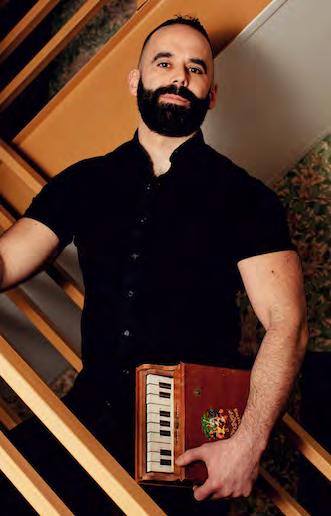
I also think that there’s an arc to this program. By the time we get there, people have opened up and they’re receptive to the unusual, and with what could be seen as shocking. The program has an arc to it. In the beginning, it kind of behaves like a piano recital and the pieces follow each other. But then it sort of begins to fall apart. And that’s by design. By the end of it, even the most conventional-minded listener may not be okay with what’s next, but curious about what’s next. How deep we can go? The peak of it is just how personal it becomes. It’s almost like when you see a star collapse into nothing in the sky and we’re left with nothing. I think of that as how the program ends. And that directness can be really powerful. It’s not even a musical thing, but a kind of spiritual thing that we’re using music as the vessel. People who come to the show are coming higher reasons than hearing the new Pamela Z piece. That’s like the cherry on top. You get to hear all this great new music, but there’s something bigger happening.t
Read the full interview, with music video clips, on www.ebar.com.
Adam Tendler performs “Inheritances” July 17, 7:30pm at Brava Theater Center, 2781 24th St. $20-$60. www.brava.org www.adamtendler.com www.otherminds.org


The audience better buckle up and prepare themselves for a night! This is a show about my life, about the person people saw on season 16. It’s an interactive experience, replete with music, comedy, and stories of my experiences. I will be performing songs off my new EP, and I hope to see you there. t
Sapphira Cristál’s ‘The Cristál Ball Tour,’ July 17, 8pm, Bimbo’s, 1025 Columbus Ave. $44.25-$80.81, 21+. www.bimbos365club.com www.sapphiracristal.com










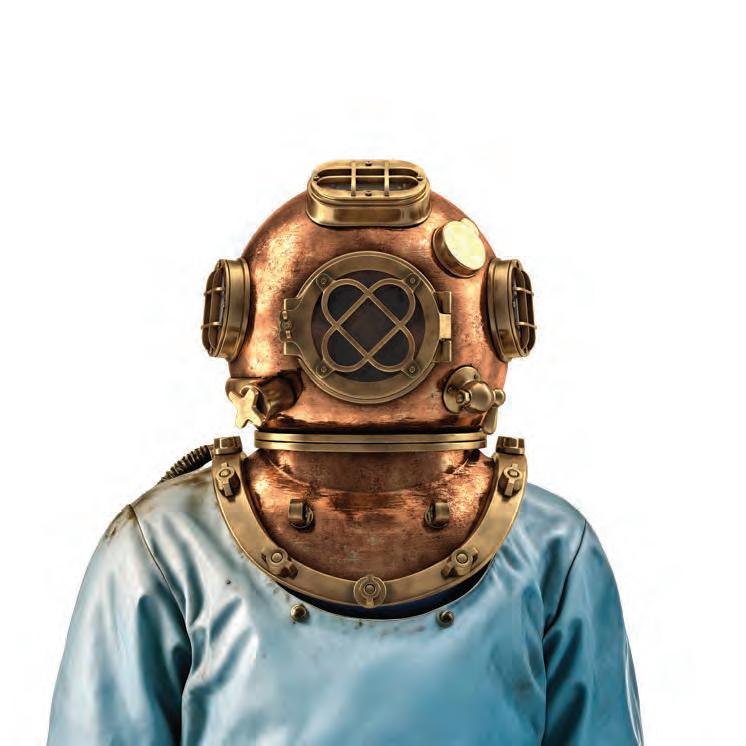
Explore the curious connections of California. From towering redwood forests to vast deserts, breathtaking coasts to bustling cities, discover the surprising relationships among species, people, and places in our majestic state.